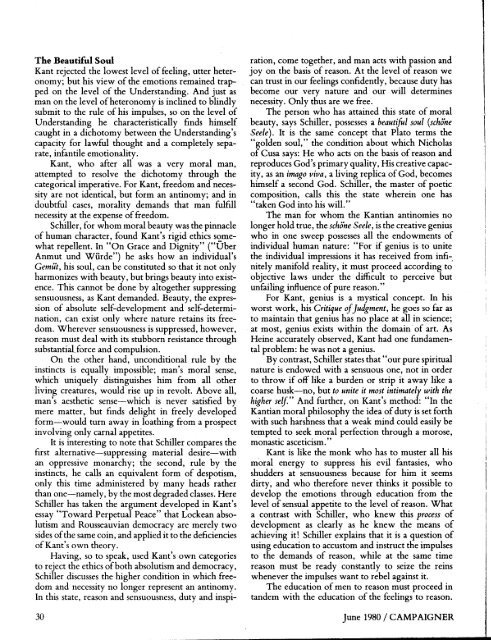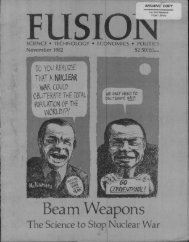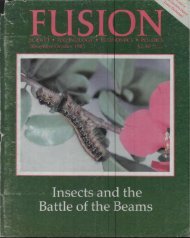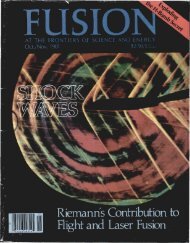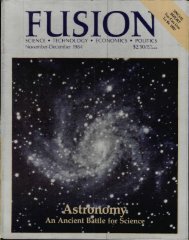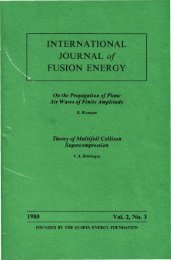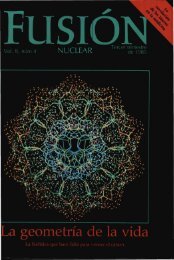Campaigner
Campaigner
Campaigner
You also want an ePaper? Increase the reach of your titles
YUMPU automatically turns print PDFs into web optimized ePapers that Google loves.
The Beautiful Soul ration, come together, and man acts with passion and<br />
Kant rejected the lowest level of feeling, utter heter- joy on the basis of reason. At the level of reason we<br />
onomy; but his view of the emotions remained trap- can trust in our feelings confidently, because duty has<br />
ped on the level of the Understanding. And just as become our very nature and our will determines<br />
man on the level ofheteronomy is inclined to blindly necessity. Only thus are we free.<br />
submit to the rule of his impulses, so on the level of The person who has attained this state of moral<br />
Understanding he characteristically finds himself beauty, says Schiller, possesses a beautiful soul (sch_'ne<br />
caught in a dichotomy between the Understanding's Seele). It is the same concept that Plato terms the<br />
capacity for lawful thought and a completely sepa- "golden soul," the condition about which Nicholas<br />
rate, infantile emotionality,<br />
of Cusa says: He who acts on the basis of reason and<br />
Kant, who after all was a very moral man, reproduces God's primaryquality, His creativecapacattempted<br />
to resolve the dichotomy through the ity, as an imago viva, a living replica of God, becomes<br />
categorical imperative. For Kant, freedom and neces- himself a second God. Schiller, the master of poetic<br />
sity are not identical, but form an antinomy; and in composition, calls this the state wherein one has<br />
doubtful cases, morality demands that man fulfill "taken God into his will."<br />
necessity at the expense of freedom. The man for whom the Kantian antinomies no<br />
Schiller, for whom moral beauty was the pinnacle longer hold true, the schb'neSeele, is the creative genius<br />
of human character, found Kant's rigid ethics some- who in one sweep possesses all the endowments of<br />
what repellent. In "On Grace and Dignity" ("rOber individual human nature: "For if genius is to unite<br />
Anmut und Wfirde") he asks how an individual's the individual impressions it has received from infi-<br />
Gemfit, his soul, can be constituted so that it not only nitely manifold reality, it must proceed according to<br />
harmonizes with beauty, but brings beauty into exist- objective laws under the difficult to perceive but<br />
ence. This cannot be done by altogether suppressing unfailing influence of pure reason."<br />
sensuousness, as Kant demanded. Beauty, the expres- For Kant, genius is a mystical concept. In his<br />
sion of absolute self-development and self-determi- worst work, his Critique ofJudgment, he goes so far as<br />
nation, can exist only where nature retains its free- to maintain that genius has no place at all in science;<br />
dom. Wherever sensuousness is suppressed, however, at most, genius exists within the domain of art. As<br />
reason must deal with its stubborn resistance through Heine accurately observed, Kant had one fundamensubstantial<br />
force and compulsion, tal problem: he was not a genius.<br />
On the other hand, unconditional rule by the By contrast, Schiller states that"our pure spiritual<br />
instincts is equally impossible; man's moral sense, nature is endowed with a sensuous one, not in order<br />
which uniquely distinguishes him from all other to throw if off like a burden or strip it away like a<br />
living creatures, would rise up in revolt. Above all, coarse husk--no, but to unite it most intimately with the<br />
man's aesthetic sense--which is never satisfied by higher self." And further, on Kant's method: "In the<br />
mere matter, but finds delight in freely developed Kantian moral philosophy the idea of duty is set forth<br />
form--would turn away in loathing from a prospect with such harshness that a weak mind could easily be<br />
involving only carnal appetites, tempted to seek moral perfection through a morose,<br />
It is interesting to note that Schiller compares the monastic asceticism."<br />
first alternative suppressing material desire--with Kant is like the monk who has to muster all his<br />
an oppressive monarchy; the second, rule by the moral energy to suppress his evil fantasies, who<br />
instincts, he calls an equivalent form of despotism, shudders at sensuousness because for him it seems<br />
only this time administered by many heads rather dirty, and who therefore never thinks it possible to<br />
than one--namely, by the most degraded classes. Here develo p the emotions through education from the<br />
Schiller has taken the argument developed in Kant's level of sensual appetite to the level of reason. What<br />
essay "Toward Perpetual Peace" that Lockean abso- a contrast with Schiller, who knew this process of<br />
lutism and Rousseauvian democracy are merely two development as clearly as he knew the means of<br />
sides of the same coin, and applied it to the deficiencies achieving it! Schiller explains that it is a question of<br />
of Kant's own theory,<br />
using education to accustom and instruct the impulses<br />
Having, so to speak, used Kant's own categories to the demands of reason, while at the same time<br />
to reject the ethics of both absolutism and democracy, reason must be ready constantly to seize the reins<br />
Schiller discusses the higher condition in which free- whenever the impulses want to rebel against it.<br />
dom and necessity no longer represent an antinomy. The education of men to reason must proceed in<br />
In this state, reason and sensuousness, duty and inspi- tandem with the education of the feelings to reason.<br />
30 June 1980 / CAMPAIGNER


